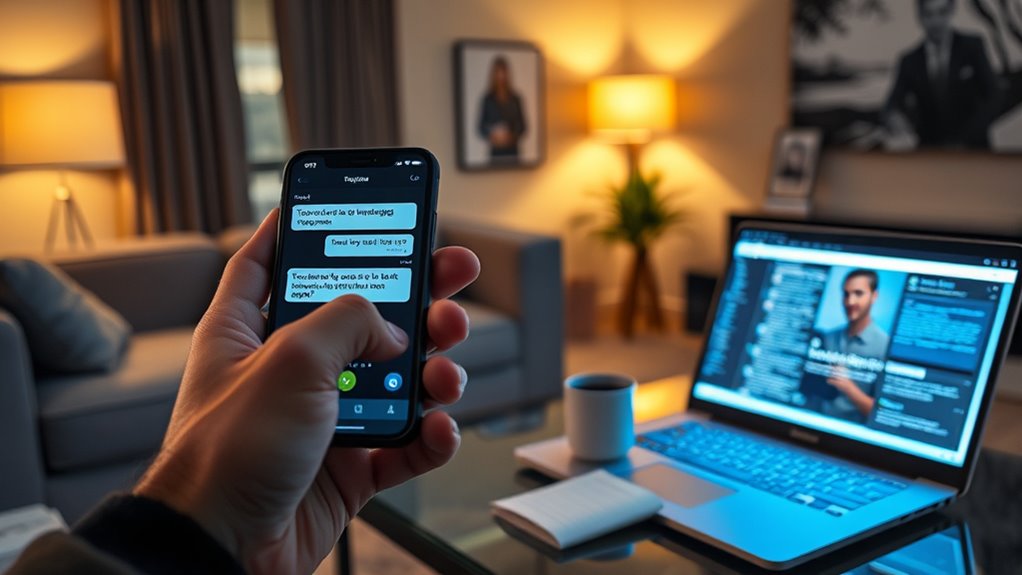To ethically catch a cheating spouse using technology, focus on open communication and lawful methods. Respect their privacy boundaries and avoid intrusive tactics like hacking or spyware without consent. Use transparent tools such as shared accounts or legal monitoring services when appropriate, and consider consulting a legal professional to stay within laws. Building trust and having honest conversations can often address suspicions more effectively. If you continue, you’ll discover more ways to navigate this sensitive situation responsibly.
Key Takeaways
- Engage in open, honest communication with your spouse about your concerns and suspicions.
- Use lawful, transparent tools like shared accounts or devices to gather information with consent.
- Avoid invasive methods such as hacking or spyware, respecting privacy laws and boundaries.
- Consider hiring a licensed private investigator for discreet, legal assistance if needed.
- Prioritize building trust and understanding through dialogue, reducing the need for covert monitoring.

When you suspect your spouse is cheating, it’s natural to feel overwhelmed and uncertain about how to find out the truth. You want answers, but you also want to respect boundaries and avoid crossing ethical lines. Using technology can be helpful, but it’s essential to consider privacy concerns and legal considerations before taking any action. You should endeavor to gather information without infringing on your spouse’s rights or violating laws, which can have serious consequences if overlooked.
First, understand that privacy concerns are at the forefront of ethical use of technology. Your spouse has a right to a certain level of privacy, even within a marriage. This doesn’t mean you should ignore suspicious behavior, but it does mean you need to be cautious about how you access information. Avoid intrusive methods like hacking into accounts or installing spyware without consent, as these actions can breach trust and may be illegal depending on your jurisdiction. Instead, focus on open communication and utilizing legal, transparent tools to gather clues.
Respect your spouse’s privacy; avoid illegal methods and focus on open communication and lawful tools.
Legal considerations are equally important. Laws regarding digital privacy vary by state and country, and what’s acceptable in one place might be illegal elsewhere. For example, recording private conversations without consent or accessing someone’s phone or email without permission can lead to criminal charges or civil lawsuits. Before using any tracking or monitoring software, research local laws thoroughly. When in doubt, consult a legal professional to ensure your actions stay within the bounds of the law.
If you decide to use technology, opt for methods that are both ethical and legal. For instance, you can check shared devices or accounts that your spouse has willingly given access to, like a family email account or social media account, if appropriate. You might also consider hiring a private investigator who specializes in discreet, lawful investigations, which can provide peace of mind while respecting legal boundaries. Additionally, understanding the importance of dynamic communication exercises can help foster an environment where honest conversations are more likely to happen naturally, reducing the need for covert monitoring.
Frequently Asked Questions
Is It Legal to Use Monitoring Apps Without My Spouse’s Knowledge?
Using monitoring apps without your spouse’s knowledge typically isn’t legal and can violate privacy laws, depending on where you live. You should consider the legal considerations and privacy concerns involved before proceeding. In most cases, it’s best to have an honest conversation instead of secretly tracking their activities. If you’re unsure, consult a legal professional to understand your rights and avoid potential legal complications.
How Can I Ensure My Privacy Isn’T Compromised When Tracking?
Imagine your digital world as a delicate glass orb—you want to monitor without shattering your privacy. To protect your privacy when tracking, choose reputable apps with strong privacy protection and data security features. Regularly update passwords, enable encryption, and limit access to your data. By doing so, you guarantee your information stays safe, your privacy remains intact, and your tools work effectively without exposing sensitive details to unnecessary risks.
What Are the Emotional Risks of Spying on a Partner?
Spying on your partner can lead to emotional consequences like increased anxiety, guilt, or mistrust, which may harm your mental health. You might feel overwhelmed or isolated as you navigate these suspicions. Constant monitoring can erode your emotional well-being, causing stress and confusion. It’s important to weigh these risks carefully, as the emotional toll could outweigh any potential answers, impacting your mental health and relationship stability.
Can Technology Help Rebuild Trust After Discovering Infidelity?
Think of technology as a bridge, helping you reconnect after betrayal. Yes, digital communication tools can foster honesty and transparency, paving the way for rebuilding trust. Coupled with therapy options, they offer a path to healing and understanding. You can share feelings openly, rebuild emotional intimacy, and address underlying issues. While challenging, leveraging technology thoughtfully can transform broken trust into a stronger, more resilient relationship.
Are There Non-Technical Ways to Address Suspicions Ethically?
Yes, there are non-technical ways to address suspicions ethically. You should prioritize open communication, sharing your feelings honestly without accusations. Consider couples therapy to create a safe space for both of you to express concerns and rebuild trust. Focus on listening actively and working together to understand each other’s perspectives. This respectful approach helps resolve doubts and strengthens your relationship without relying on technology.
Conclusion
Remember, using technology ethically can feel like wielding a double-edged sword—powerful yet risky. If you choose to investigate, do so with integrity and respect for privacy. Think of it as steering through a minefield; one wrong step can blow up your trust and peace of mind. Stay cautious, stay respectful, and remember that honesty is always the safest path. Ultimately, your goal should be clarity, not chaos, to protect your heart without losing your soul.









